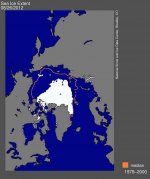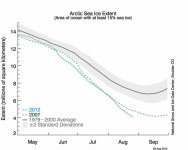its bit curious.
the poles have melted alot yeah?
but you, looking down at the harbor and some beaches i remember quite intimately as a kid.
the waterlevel is not higher.
not really noticably.
that is true, relatively anyways
the northern icecap could melt completely, and the change in ocean level?
basically nothing, the northern ice cap is already displacing its water volume
there is some debate how small a change it would be
now the Greenland glaciers and the Antarctic ice sheets, those would do some shit
they're up on dry land




